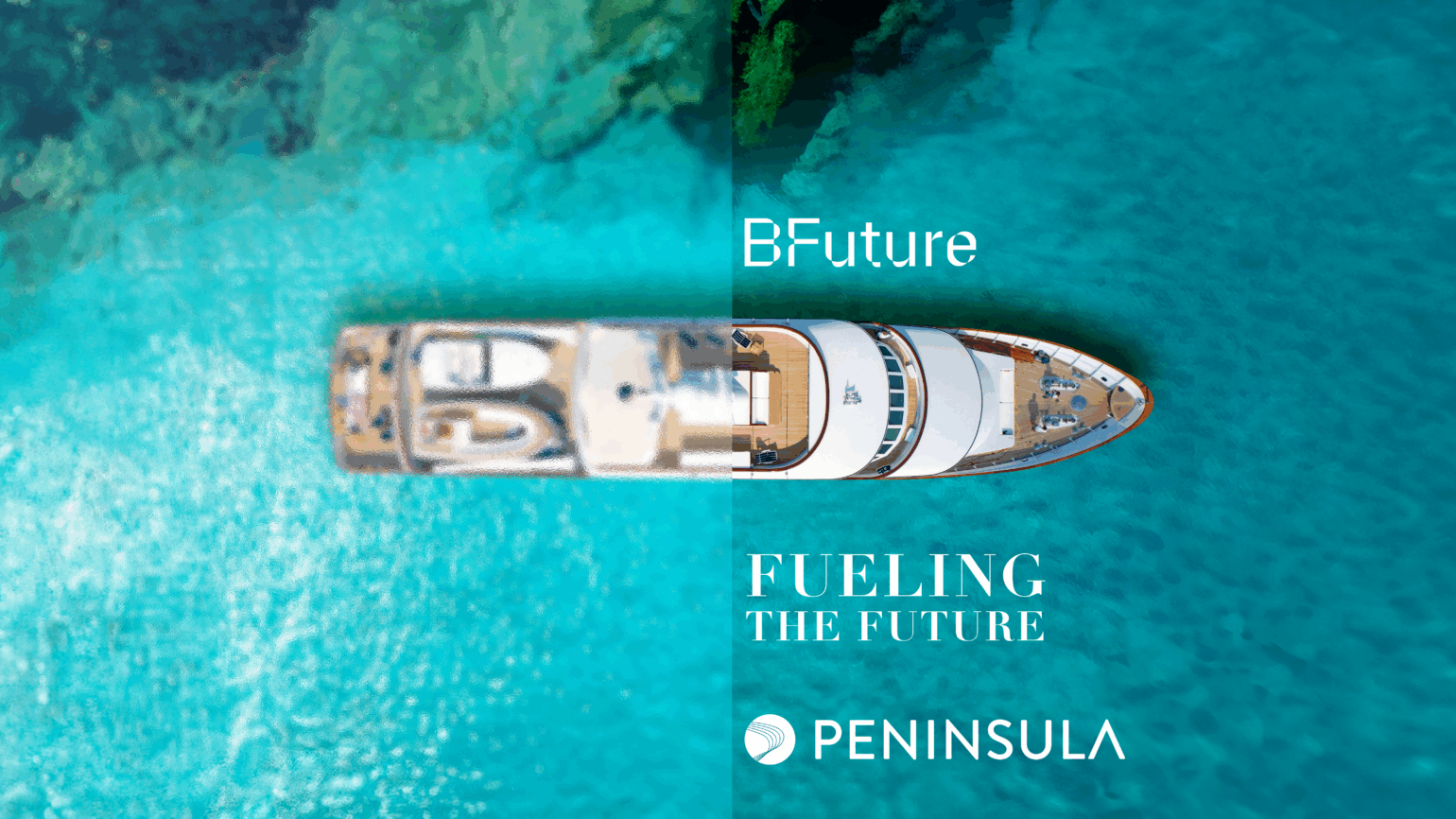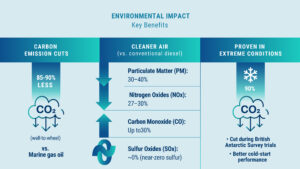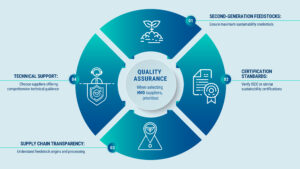
Marine gas oil continues to evolve as a critical fuel source for modern yachting operations. Still, the industry now stands at a pivotal moment with the emergence of Hydrotreated Vegetable Oil (HVO) as a transformative alternative. This evolution represents more than just a fuel switch of marine gas oil MGO—it’s a fundamental shift toward cleaner, more efficient marine operations that delivers immediate environmental benefits while enhancing vessel performance. Peninsula leads this transition with BFuture, the premium HVO product that sets new standards for sustainable marine fuel.
Understanding HVO: The Science Behind the Solution
Hydrotreated Vegetable Oil represents second-generation biofuel technology that fundamentally differs from traditional biodiesel. HVO is produced through a sophisticated hydrotreatment process where renewable feedstocks—including used cooking oils, animal fats, and non-food crop oils—undergo hydrogenation at high temperatures exceeding 300°C.
Unlike first-generation biodiesels such as FAME (Fatty Acid Methyl Esters), HVO contains no oxygen content, eliminates aromatics, and achieves virtually zero sulfur content. The hydrotreatment process produces uniform hydrocarbon molecules with exceptional stability, making HVO suitable for extended storage periods of up to 10 years without degradation.
Environmental Impact: Quantifying the Benefits
Carbon Emission Reductions
HVO delivers unprecedented carbon emission reductions compared to conventional marine gas oil. Multiple independent studies confirm that HVO can reduce lifecycle CO₂ emissions by 85-90% on a well-to-wheel basis.
Additional Environmental Benefits
Beyond carbon reduction, HVO significantly improves local air quality through reduced harmful emissions:
- Particulate Matter (PM): Reductions of 30-40% compared to conventional diesel
- Nitrogen Oxides (NOx): Decreases of 27-30% in most applications
- Carbon Monoxide (CO): Reductions of up to 30%
- Sulfur Oxides (SOx): Virtual elimination due to near-zero sulfur content

The British Antarctic Survey’s trials with HVO on the RRS Sir David Attenborough demonstrate these benefits in extreme marine conditions. The 90% instant carbon emission reduction was achieved alongside improved cold-start performance.
Performance Advantages for Marine Applications
Superior Combustion Characteristics
HVO’s chemical composition delivers measurable performance improvements over conventional marine gas oil. The fuel exhibits exceptional cetane numbers typically ranging from 70-90, significantly higher than the 40-50 range of conventional diesel. This elevated cetane index facilitates more complete combustion, resulting in:
- Enhanced Power Output: Higher energy content per metric tonne generates increased power for propulsion and onboard systems
- Improved Fuel Efficiency: More complete combustion reduces fuel consumption while extending cruising ranges
- Smoother Engine Operation: Reduced engine noise and vibration due to superior combustion quality
- Extended Component Life: Lower operating temperatures reduce strain on vital engine components
Independent testing by Rolls-Royce using mtu Series 4000 generators confirmed these benefits, showing decreased NOx, CO₂, and particulate matter emissions alongside improved response to load acceptance and decreased fuel consumption.
Cold Weather Performance
HVO demonstrates exceptional cold-flow properties with cloud points typically below -40°C and Cold Filter Plugging Points (CFPP) that virtually correspond to cloud point values. This performance proves particularly valuable for yachts operating in higher latitudes or during shoulder seasons when conventional fuels may experience waxing issues.
Peninsula Yacht Services: Leading the HVO Revolution with BFuture
Peninsula Yacht Services has positioned itself at the forefront of the marine HVO transition through its comprehensive BFuture offering. As the world’s largest independent superyacht fuel provider, Peninsula recognised early that varying HVO specifications in the market required a premium, standardised solution.
BFuture: Setting New Standards
BFuture represents Peninsula’s commitment to providing only the highest quality HVO available. The company exclusively sources second-generation HVO derived from waste feedstocks and residues, maximising greenhouse gas emission reductions of 80-90% compared to conventional diesel.
Performance Specifications
BFuture HVO delivers measurable improvements in multiple performance metrics:
| Performance Parameter | Conventional MGO | BFuture HVO | Improvement |
| Energy Content | Standard | Higher per metric tonne | Enhanced power output |
| Cetane Number | 40–50 | Elevated | Improved combustion quality |
| Exhaust Smoke Reduction | Baseline | 35% reduction | Cleaner guest experience |
| Storage Stability | 12 months typical | 15+ years | Extended fuel security |
| Carbon Emissions | Baseline | 80–90% reduction | Environmental compliance |
Comparative Analysis: MGO vs HVO Performance
Technical Specifications Comparison
| Property | Marine Gas Oil (DMA) | HVO (EN 15940) | Advantage |
| Sulfur Content | ≤ 0.10% m/m | ≤ 0.001% m/m | HVO: Virtually sulfur-free |
| Density @ 15°C | ≤ 890 kg/m³ | 765-800 kg/m³ | HVO: Lower density |
| Cetane Number | ≥ 40 | 70-90 | HVO: Superior ignition quality |
| Aromatics Content | Up to 30% | ≤ 1% | HVO: Cleaner combustion |
| Viscosity @ 40°C | ≤ 6 cSt | 2-4 cSt | HVO: Better flow properties |
| Flash Point | ≥ 60°C | >70°C | HVO has higher flash point |
Environmental Impact Comparison
| Emission Parameter | MGO | HVO | Reduction with HVO |
| CO₂ Emissions (lifecycle) | Baseline | 85-90% reduction | Significant climate benefit |
| Particulate Matter | Baseline | 30-40% reduction | Improved air quality |
| NOx Emissions | Baseline | 27-30% reduction | Reduced harmful emissions |
| Carbon Monoxide | Baseline | 30% reduction | Better local air quality |
| Exhaust Smoke Visibility | Baseline | 35% reduction | Enhanced guest experience |
Engine Compatibility and Manufacturer Approvals
The molecular similarity between HVO and conventional diesel enables seamless integration without engine modifications or infrastructure investments. This compatibility allows for flexible blending ratios, enabling yacht operators to start with HVO blends and gradually transition to 100% HVO as operational experience grows.
Real-World Implementation
Commercial Marine Applications
Independent testing using ISO 8178 marine standards demonstrated significant benefits when replacing conventional B7 diesel with HVO in medium-duty diesel engines. Results showed improvements in NOx, particulate matter, and mass fuel consumption, with no impact on engine power and minimal deterioration of volumetric fuel economy.
These findings confirm HVO’s suitability for marine applications across various vessel types and operating conditions.
Future Outlook and Industry Transformation
Regulatory Drivers
The marine industry faces increasing pressure from environmental regulations, driving adoption of cleaner fuels. IMO 2020 sulfur regulations already favour low-sulfur alternatives like HVO, while emerging carbon intensity regulations will further accelerate adoption.
The UK government’s Renewable Transport Fuel Obligation (RTFO) specifically supports HVO use in inland waterway vessels and recreational craft, providing financial incentives that improve cost competitiveness.
Technology Evolution
HVO represents a transitional technology bridging current operations with future zero-emission solutions. As the industry develops hydrogen, ammonia, and other alternative fuels, HVO provides immediate emission reductions without requiring infrastructure overhaul.
Peninsula positions BFuture as part of this transition strategy, offering yacht operators immediate environmental benefits while maintaining operational flexibility for future fuel developments.
Practical Implementation Guidelines
Quality Assurance
When selecting HVO suppliers, prioritise:
- Second-Generation Feedstocks: Ensure maximum sustainability credentials
- Certification Standards: Verify ISCC or similar sustainability certifications
- Supply Chain Transparency: Understand feedstock origins and processing
- Technical Support: Choose suppliers offering comprehensive technical guidance
Charting a Sustainable Course
The convergence of marine gas oil’s proven reliability with HVO’s revolutionary environmental benefits creates unprecedented opportunities for sustainable yachting operations. BFuture by Peninsula Yacht Services exemplifies how industry leaders are transforming fuel supply chains to deliver immediate climate benefits while enhancing vessel performance.
As regulatory pressure intensifies and environmental consciousness grows, HVO adoption will accelerate from early adopter trials to mainstream implementation. Peninsula’s investment in BFuture infrastructure and quality standards demonstrates the industry’s commitment to supporting this transition comprehensively.
For yacht operators, the question is no longer whether to adopt HVO, but how quickly to implement a transition strategy that captures both environmental and operational benefits. The future of marine fuel has arrived, and it burns cleaner, performs better, and delivers the sustainable luxury that tomorrow’s yachting industry demands.
Through continued innovation in fuel quality, supply chain development, and technical support, Peninsula Yacht Services ensures that the transition to sustainable marine operations remains as smooth as the waters these advanced fuels help preserve.


